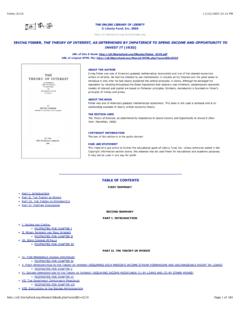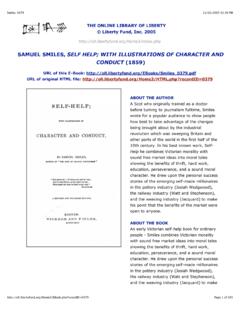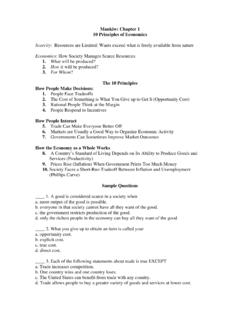Transcription of The Online Library of Liberty
1 The Online Library of LibertyA Project Of Liberty Fund, Marshall, principles of Economics (8th ed.)[1890]The Online Library Of LibertyThis E-Book (PDF format) is published by Liberty Fund, Inc., a private,non-profit, educational foundation established in 1960 to encourage study of the idealof a society of free and responsible individuals. 2010 was the 50th anniversary year ofthe founding of Liberty is part of the Online Library of Liberty web , whichwas established in 2004 in order to further the educational goals of Liberty Fund, find out more about the author or title, to use the site's powerful search engine, tosee other titles in other formats (HTML, facsimile PDF)
2 , or to make use of thehundreds of essays, educational aids, and study guides, please visit the OLL web title is also part of the Portable Library of Liberty DVD which contains over1,000 books and quotes about Liberty and power, and is available free of charge cuneiform inscription that appears in the logo and serves as a design element inall Liberty Fund books and web sites is the earliest-known written appearance of theword freedom (amagi), or Liberty . It is taken from a clay document written about2300 in the Sumerian city-state of Lagash, in present day find out more about Liberty Fund, Inc., or the Online Library of Liberty Project,please contact the Director FUND, Allison Pointe Trail, Suite 300 Indianapolis, Indiana 46250-1684 Edition Used: principles of Economics(London: Macmillan and Co.)
3 8th ed. 1920).Author:Alfred MarshallAbout This Title:This is the 8th edition of what is regarded to be the first modern economicstextbook, leading in various editions from the 19th into the 20th century. The final 8thedition was Marshall s most-used and Library of Liberty : principles of Economics (8th ed.)PLL (generated September, 2011)2 Liberty Fund: Liberty Fund, Inc. is a private, educational foundation established to encourage thestudy of the ideal of a society of free and responsible Information:The text is in the public Use Statement:This material is put Online to further the educational goals of Liberty Fund, otherwise stated in the Copyright Information section above, this material maybe used freely for educational and academic purposes.
4 It may not be used in any wayfor Library of Liberty : principles of Economics (8th ed.)PLL (generated September, 2011)3 Of ContentsBook I: Preliminary I, Chapter I: I, Chapter II: The Substance of I, Chapter III: economic Generalizations Or I, Chapter IV: The Order and Aims of economic II: Some Fundamental Ii, Chapter I: Ii, Chapter II: Ii, Chapter III: Production. Consumption. Labour. Ii, Chapter IV: Income. III: On Wants and Their Iii, Chapter I: Iii, Chapter II: Wants In Relation to Iii, Chapter III: Gradations of Consumers' Iii, Chapter IV: The Elasticity of Iii, Chapter V: Choice Between Different Uses of the Same and Deferred Iii, Chapter VI: Value and IV: The Agents of Production.
5 Land, Labour, Capital and Iv, Chapter I: Iv, Chapter II: The Fertility of Iv, Chapter III: The Fertility of Land, Continued. the Tendency toDiminishing Iv, Chapter IV: The Growth of Iv, Chapter V: The Health and Strength of the Iv, Chapter VI: Industrial Iv, Chapter VII: The Growth of Iv, Chapter VIII: Industrial Iv, Chapter IX: Industrial Organization, Continued. Division of Influence of Iv, Chapter X: Industrial Organization, Continued. the Concentration ofSpecialized Industries In Particular Iv, Chapter XI: Industrial Organization, Continued. Production On aLarge Iv, Chapter XII: Industrial Organization, Continued.
6 Iv, Chapter XIII: Conclusion. Correlation of the Tendencies to Increasingand to Diminishing V: General Relations of Demand, Supply and V, Chapter I: Introductory. On V, Chapter II: Temporary Equilibrium of Demand and V, Chapter III: Equilibrium of Normal Demand and V, Chapter IV: The Investment and Distribution of Library of Liberty : principles of Economics (8th ed.)PLL (generated September, 2011)4 V, Chapter V: Equilibrium of Normal Demand and Supply, Continued,With Reference to Long and Short V, Chapter VI: Joint and Composite Demand. Joint and V, Chapter VII: Prime and Total Cost In Relation to Joint Products.
7 Costof Marketing. Insurance Against Risk. Cost of V, Chapter VIII: Marginal Costs In Relation to Values. V, Chapter IX: Marginal Costs In Relation to Values. General principles , V, Chapter X: Marginal Costs In Relation to Agricultural V, Chapter XI: Marginal Costs In Relation to Urban V, Chapter XII: Equilibrium of Normal Demand and Supply, Continued,With Reference to the Law of Increasing V, Chapter XIII: Theory of Changes of Normal Demand and Supply InRelation to the Doctrine of Maximum V, Chapter XIV: The Theory of V, Chapter XV: Summary of the General Theory of Equilibrium ofDemand and VI: The Distribution of the National Vi, Chapter I: Preliminary Survey of Vi, Chapter II: Preliminary Survey of Distribution, Vi, Chapter III.
8 Earnings of Vi, Chapter IV: Earnings of Labour, Vi, Chapter V: Earnings of Labour, Vi, Chapter VI: Interest of Vi, Chapter VII: Profits of Capital and Business Vi, Chapter VIII: Profits of Capital and Business Power, Vi, Chapter IX: Rent of Vi, Chapter X: Land Vi, Chapter XI: General View of Vi, Chapter XII: General Influences of economic Vi, Chapter XIII: Progress In Relation to Standards of a the Growth of Free Industry and B 33 the Growth of economic C 51 the Scope and Method of D 57 Uses of Abstract Reasoning In E 58 Definitions of F Barter 63 .Appendix G 64 the Incidence of Local Rates, With Some Suggestions As H 76 Limitations of the Use of Statical Assumptions In Regard toIncreasing I 87 Ricardo's Theory of J 92 the Doctrine of the K Certain Kinds of L 101 Ricardo's Doctrine As to Taxes and Improvements Library of Liberty : principles of Economics (8th ed.)
9 PLL (generated September, 2011)5 [Back to Table of Contents]BOOK IPRELIMINARY I, CHAPTER IINTRODUCTION. Economy or Economics is a study of mankind in the ordinary businessof life; it examines that part of individual and social action which is most closelyconnected with the attainment and with the use of the material requisites of it is on the one side a study of wealth; and on the other, and more important side,a part of the study of man. For man's character has been moulded by his every-daywork, and the material resources which he thereby procures, more than by any otherinfluence unless it be that of his religious ideals; and the two great forming agenciesof the world's history have been the religious and the economic .
10 Here and there theardour of the military or the artistic spirit has been for a while predominant: butreligious and economic influences have nowhere been displaced from the front rankeven for a time; and they have nearly always been more important than all others puttogether. Religious motives are more intense than economic , but their direct actionseldom extends over so large a part of life. For the business by which a person earnshis livelihood generally fills his thoughts during by far the greater part of those hoursin which his mind is at its best; during them his character is being formed by the wayin which he uses his faculties in his work, by the thoughts and the feelings which itsuggests, and by his relations to his associates in work, his employers or very often the influence exerted on a person's character by the amount of hisincome is hardly less, if it is less, than that exerted by the way in which it is earned.


















